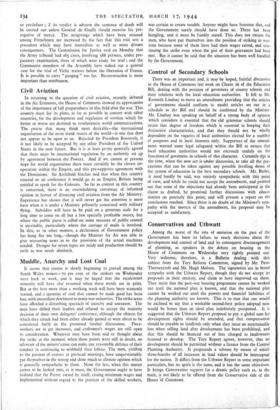Control of Secondary Schools
There was an important and, it may be hoped, fruitful discussion in the House of Commons last week on Clause 16 of the Education Bill, dealing with the position of governors of county schools and their relations with the local education authorities. It fell to Mr. Kenneth Lindsay to move an amendment providing that the articles of government should conform to model articles set out in a schedule to the Bill and should be confirmed by the Minister. Mr. Lindsay was speaking on behalf of a strong body of opinion which considers it essential that the old grammar schools should retain that degree of freedom which is essential to keeping their distinctive characteristics, and that they should not be wholly dependent on the vagaries of local authorities elected for a number of purposes and in local interests only. Supporters of the amend- ment wanted some legal safeguard within the Bill to ensure that local education authorities would not encroach unduly on the functions of governors in schools of this character. Certainly this is the time, when the new act is under discussion, to take all the pre- cautions that can be taken against any possible levelling down of the system of education in the best secondary schools. Mr. Butler, it need hardly be said, was entirely sympathetic with this point of view, and while he could not accept the amendment, and pointed out that some of the objections had already been anticipated in the clause as drafted, he promised further discussions with' educa- tionists on preciSely this point, and will present a report on the conclusions reached. Since there is no doubt of the Minister's sym- pathy with the movers of the amendment, his proposal may be accepted as satisfactory.


























 Previous page
Previous page